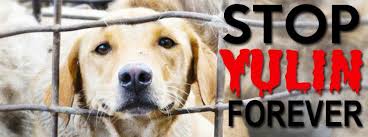China is in the middle of a war on dogs. This war, unprecedented in human history, was started in 2010 by dog meat traders of Yulin in southwest China’s Guangxi province.Traders launched the “Yulin Dog Meat Festival” for the summer solstice, and it begins on June 21 every year.
Prior to this, the Chinese public had chosen to ignore the country’s dog meat industry. The “festival” helped end public indifference—and animal activists in China were the first to condemn it.
Despite traders’ claims, the festival did not exist before 2010. Similarly, dog meat consumption, a so-called local “folk diet,” is not part of the mainstream food culture of the region either. A survey conducted by Guo Peng at Shandong University confirmed that dog meat consumption was a sporadic and minority eating habit in Yulin.
Another survey conducted in 2017 by Beijing’s Capital Animal Welfare Association and Vshine Animal Protection Association found that dog meat consumption in the city was not even remotely close to the consumption of pork, beef, chicken and other animal products. Most respondents had actually eaten dog meat by accident.
Each year, 10 million dogs are slaughtered for food in China, out of 20-30 million dogs globally. It is the world’s largest dog meat market, with 97,000 tons of dog meat produced yearly. Compared to the 80 million tons of livestock meat in China, however, dog meat is like a drop in a bucket.
The dog meat industry, born in the early 1980s in response to the state’s economic liberalization policy, is also negligible as a contributor to the national economy. It employs less than one million in the production chain that includes dog collection, transport, slaughter and processing. China’s total labor force is 776 million.
Like the dog meat industry in general, the public is against the cruel Yulin Dog Meat Festival. China does not have dog farms, so the industry relies on a series of illegal activities to get the supply—predominantly theft. To steal dogs quickly and without detection, thieves tend to use a steel string to grab the dog by the neck, often cutting deep into the fresh of the poor animal.
A transporter typically collects 500 or more dogs for the long-distance trip to be cost-effective. It takes about 20 days to get the number of dogs for one truckload. During this time, dogs are kept in squalid and increasingly crowded enclosures, a hotbed for the spread of diseases. Transport on the highway can take 72 hours or more. Dogs are crammed into small wire cages causing bodily injuries that attract flies and feed maggots.
Loading and unloading is also brutal. The cages are often smashed down to the ground, breaking limbs and fracturing paws. The gross inhumanity of humans, however, is displayed during the course of slaughter. Dogs are butchered in front of other dogs waiting for their turn. I have visited Yulin during the festival three times, and it’s clear to me that the distressed dogs who witness the slaughter in front of them have died mentally many times already.
Dogs huddle together and hide behind any objects away from the ongoing slaughter. You can see that they understand what is going on. In 2016, I visited a slaughterhouse right after the morning slaughter was completed, and saw 12 live dogs standing in the pool of blood. All of them looked stoic and expressionless. When I approached them, they avoided eye contact with me. None of them displayed any emotion. Their quietness was actually thundering. These were psychologically destroyed dogs.
The slaughterhouse workers I met were a bunch of individuals who were completely desensitized. They did not see the fear displayed by the dogs and they did not hear their wailing. “We do not torture them,” they answered when I asked if they abused the dogs for the alleged better-tasting meat. “We do not have the time to torture each and every dog slowly,” they added. They were not lying. They were clearly in the business for a livelihood.
In Yulin, there are dog lovers too, but they tend to keep quiet when outside activists flock to the city to protest. Others act privately to help the outside activists. There is no shortage of locals who see Chinese and foreign activists as hostile forces against Yulin and China, however.
Dog thieves have also been caught using poison to steal dogs, and Chinese law enforcement agencies have uncovered criminal rings involved in selling poisoned dogs to restaurants and meat processing factories.
Besides poisoned dog meat, dogs slaughtered for food are often dying or diseased animals. Up to 10% of the dogs in a live dog market I investigated in Yulin in June 2014 had skin diseases. According to China’s food safety law, diseased animals and animals that died of illnesses or unknown causes cannot be sold for food. In the last three decades, Chinese media has reported a large number of food poisoning cases from consuming dog meat. Regulation on meat and dairy products does not apply to dog meat so the food safety danger is unquestionable.
China also has the second largest number of human rabies cases in the world. Dog meat consumption itself does not spread rabies, but handling, slaughtering and processing a large number of health-compromised dogs exposes traders to the danger of rabies infection through cuts, scratches and dog bites. China’s government has vowed to eliminate rabies by 2025, but Yulin festival and the dog meat trade is likely to stop this from being achieved.
In Yulin, dog slaughter has taken place out on the streets, in marketplaces, as well as in front of restaurants and next to schools where young children are around. Those involved have been condemned for violating the state’s law for the protection of the welfare of young people. Critics fear that the industry is making China’s young generation indifferent and desensitized to suffering and injustice.
Worldwide condemnation in the past few years has woken up Yulin authorities, however. In 2014, the Yulin city government took steps to disassociate itself with the local dog meat industry, denying that it had ever endorsed the “festival.” It also issued an internal order to all government employees not to visit dog meat restaurants during the event. The word “dog” was removed or covered on business signs and traders were told to reduce sales and slaughter number.
As a result, since 2014, the “Yulin Dog Meat Festival” has been much subdued. Public slaughter has been banned. Slaughterhouses inside the city have been moved to the suburbs.
Yulin authorities are not ready to officially end the event, just as the national government is yet to outlaw the dog meat industry. As mentioned earlier, the industry is negligible in China’s gigantic economy, in employment, and in revenue generation. Chinese national and local officials have expressed on various occasions that they personally stand against dog meat consumption, but the authorities know that dog meat traders—although an absolute minority in the labor force—are the most uneducated, least skilled, and most disadvantaged of the former peasants.
If the government ends the industry, it will be obligated to provide an alternative livelihood for the traders. Politically, the least risky approach the government can take is to let the industry die a natural death. At a time when the Chinese government aims to lift the remaining 30 million people out of poverty, outlawing the dog meat industry could drive traders out of jobs and leave them below the poverty line.
There is little doubt that the festival and the industry will be ended in the future. Dog meat used to be one of the much-prized foods in ancient times but it was discredited and banned from the dinner tables of noble households over 2,000 years ago.
What will speed up the demise of the industry is the new and phenomenal change taking place in today’s China. It has crossed the threshold marking it a middle-income country. Urbanization is causing a culture change that means dogs and cats are being seen more as companions, as opposed to a source of income.
The children of Yulin’s dog meat traders whom I interviewed are unwilling to inherit the profession from their parents. Importantly, in both Hong Kong and Taiwan, dog meat consumption has been made illegal. There is no reason to believe that mainland China can not achieve the same.





